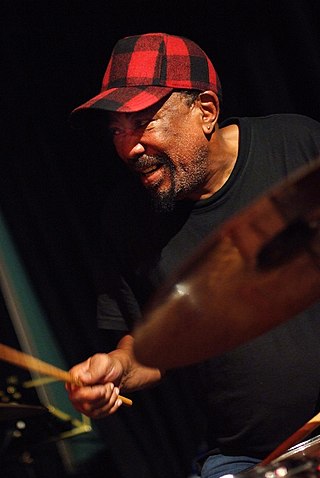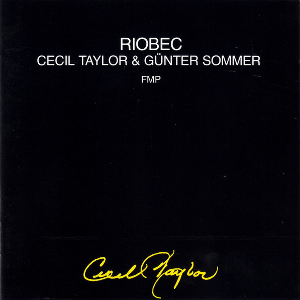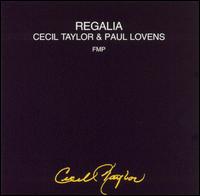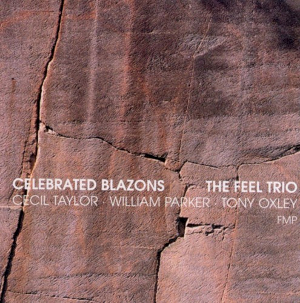
Cecil Percival Taylor was an American pianist and poet.

Kenneth Vincent John Wheeler, OC was a Canadian composer and trumpet and flugelhorn player, based in the U.K. from the 1950s onwards.

Louis Tebogo Moholo, is a South African jazz drummer. He has been a member of several notable bands, including The Blue Notes, the Brotherhood of Breath and Assagai.
Frank Wright was an American free jazz musician, known for his frantic style of playing the tenor saxophone. Critics often compare his music to that of Albert Ayler, although Wright "offers his honks and squawks with a phraseology derived from the slower, earthier funk of R&B and gospel music." According to AllMusic biographer Chris Kelsey, Wright "never recorded even a single record under his own name for a major label; he was 'underground' his entire career." In addition to tenor saxophone, Wright also played the soprano saxophone and bass clarinet.

Cecil Taylor Unit is an album by Cecil Taylor recorded in April 1978 and released on the New World label. The album features three performances by Taylor on piano with alto saxophonist Jimmy Lyons, trumpeter Raphe Malik, violinist Ramsey Ameen, bassist Sirone and drummer Ronald Shannon Jackson. The album was recorded during the same sessions that produced 3 Phasis. Taylor is heard on a 96-key Bösendorfer piano about which he commented: it "will stop you cold if you're not ready."

Riobec is a live album by pianist Cecil Taylor and drummer Günter Sommer recorded in Berlin on June 17, 1988 as part of month-long series of concerts by Taylor and released on the FMP label.

In East Berlin is an album featuring two concerts by Cecil Taylor, one solo and one accompanied by Günter Sommer, recorded in Berlin on June 20 and 21, 1988 as part of a month-long series of concerts by Taylor and released on the FMP label.

Regalia is a live album by Cecil Taylor and Paul Lovens recorded in Berlin on June 26, 1988 as part of month-long series of concerts by Taylor and released on the FMP label.

The Hearth is a live album featuring a performance by Cecil Taylor with Tristan Honsinger and Evan Parker recorded in Berlin on June 30, 1988, as part of month-long series of concerts by Taylor and released on the FMP label.

Spots, Circles, and Fantasy is a live album featuring a performance by Cecil Taylor and Han Bennink recorded in Berlin on July 10, 1988 as part of month-long series of concerts by Taylor and released on the FMP label.

Legba Crossing is a live album featuring a performance by Cecil Taylor's Workshop Ensemble recorded in Berlin on July 15, 1988 as part of month-long series of concerts by Taylor and released on the FMP label. Taylor did not play the piano on this album, but instead directed the ensemble and contributed vocalizations.

Erzulie Maketh Scent is a live album featuring a solo performance by pianist Cecil Taylor recorded in Berlin on July 16, 1988 as part of month-long series of concerts by Taylor and released on the FMP label.

Leaf Palm Hand is a live album featuring a performance by pianist Cecil Taylor and drummer Tony Oxley recorded in Berlin on July 17, 1988 as part of month long series of concerts by Taylor and released on the FMP label.

Looking Corona is a live album featuring performances by Cecil Taylor with Harald Kimmig, Muneer Abdul Fataah, William Parker and Tony Oxley recorded in Berlin on November 3 & 4, 1989 and released on the FMP label.

Looking The Feel Trio is a live album featuring performances by Cecil Taylor with William Parker and Tony Oxley recorded in Berlin on November 2, 1989 and released on the FMP label.

Celebrated Blazons is a live album featuring performances by Cecil Taylor with William Parker and Tony Oxley recorded at the Akademie der Künste in Berlin on June 29, 1990 and released on the FMP label.

CT: The Dance Project is a live album by Cecil Taylor recorded during the Summer Music concert series at the Akademie der Kunste, Berlin on July 8, 1990, and released in 2008 by FMP. The album documents a multimedia event that featured Taylor, bassist William Parker, percussionist Masashi Harada, and a group of four dancers.

Incarnation is a live album by American pianist Cecil Taylor. It was recorded on November 4, 1999 during the "Total Music Meeting" at the "Podewil" in Berlin, and was released in 2004 by FMP. On the album, Taylor is joined by guitarist Franky Douglas, cellist Tristan Honsinger, and drummer Andrew Cyrille.

Almeda is a live album by Cecil Taylor recorded during the "Total Music Meeting" at the "Podewil", the headquarters of the Kulturprojekte Berlin non-profit organisation, on November 2, 1996, and released in 2004 on the FMP label. The album features Taylor with eight other musicians, and is a recording of a single performance lasting over an hour. The same group recorded the album The Light of Corona the following day. In 2012, FMP also released Almeda , with the same musicians, as part of their Archive Edition.

Corona is a live album by Cecil Taylor recorded during the "Total Music Meeting" at the "Podewil", the headquarters of the Kulturprojekte Berlin non-profit organisation, on November 1, 1996, one day before the recording of the Taylor album Almeda, and two days before the recording of The Light of Corona. It was released in 2018 in digital format by the FMP label as part of their Archive Edition, and was reissued in 2021 in CD format by Corbett vs. Dempsey.



















